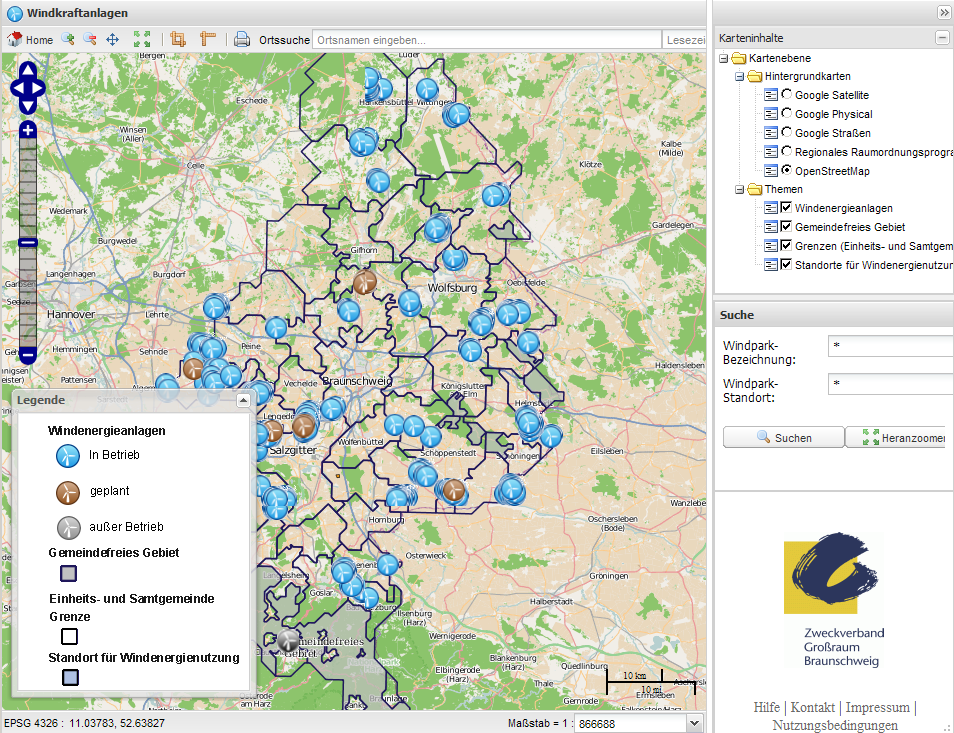
GeoServer is an open source software server written in Java that allows users to share and edit geospatial data. Designed for interoperability, it publishes data from any major spatial data source using open standards.
Being a community-driven project, GeoServer is developed, tested, and supported by a diverse group of individuals and organizations from around the world.
GeoServer is the reference implementation of the Open Geospatial Consortium (OGC) Web Feature Service (WFS) and Web Coverage Service (WCS) standards, as well as a high performance certified compliant Web Map Service (WMS). GeoServer forms a core component of the Geospatial Web.

GeoServer Features
- Fully compliant to WMS (1.1.1 and 1.3), WFS (1.0 and 1.1, transactions and locking) and WCS (1.0 and 1.1) specifications, as tested by the CITE conformance tests. GeoServer additionally serves as Reference Implementation for WCS 1.1 and WFS 1.0 and 1.1
- Implemeting WPS 1.0 (OGC does not provide a test suite providing proof of compliance at the time of writing)
- Easy to use web-based configuration tool - no need to touch long, complicated config files.
- Mature support for PostGIS, Shapefile, ArcSDE, DB2 and Oracle.
- VPF, MySQL, MapInfo, and Cascading WFS are also supported formats.
- Native Java support for GeoTIFF, GTOPO30, ArcGrid, WorldImages, ImageMosiacs and Image Pyramids
- Support for MrSID, ECW, JPEG2000, DTED, Erdas Imagine, and NITF through [GDAL ImageIO Extension]. Any format that GDAL support scan be added with a bit of coding.
- On the fly reprojection, for WMS and WFS, with an embedded EPSG database supporting hundreds of projections by default.
- Web Map output as JPEG, GIF, PNG, PDF, SVG, KML, [GeoRSS].
- Excellent [Google Earth Support], including advanced features like super overlays (vector and raster), 2.5D extrudes, Time, advanced template options for pop-ups and titles, and styling with SLD.
- Ability to 'publish' data to Google's geo crawlers, so data from GeoServer can be exposed on Google Maps and Earth searches.
- Integration with [GeoWebCache], for accelerated tile mapping (like on Openlayers or Google Maps)
- Raw vector data available as GML (2.1.2 and 3.1.1), GeoJSON, and zipped Shapefiles through the WFS.
- Anti-aliased images by default, with option to turn off or to use a [custom defined palette] for increased performance.
- Integrated OpenLayers as a default ajax viewer and preview engine.
- Standards compliant 'by default' - no need to figure out complex configuration options just to serve basic data.
- Performance, on par with the fastest open source mapping servers, and we are quite confident that we do faster rendering than any major proprietary server.
- Support for atomic database transactions through the standard WFS-T protocol, available on all data formats.
- Versioning WFS to support wiki-style history, attribution, and rollbacks on geospatial data.
- [Integrated Security]through the powerful acegijava framework, to secure individual services and layers to groups of users.
- User Interface translated in to French, German, Spanish, Portuguese, Dutch, Japanese, Chinese, Russian and more.
- Support for Component WMS / Feature Portrayal Service
- Long Transactions through a full implementation of the Locking portion of the WFS specification.
- Streaming data readers: no memory bound limit to the amount of data that can be returned.
- Full SLD support, the open standard to define map styles, including both user defined (POST and GET) and used natively in styling configuration.
- Full Filter support on all data formats in WFS (but optimized for backend format where possible).
- Innovative Validation Engine that checks inserted features against a configured set of topological and attributed based rules, to maintain backend integrity.
- Java (J2EE) servlet-based, can run in any servlet container. This means we easily support 64-bit architectures and advanced multi-threading capabilities.
- Designed for extension, source code that's a pleasure to read.
- Easy to write new data formats with GeoTools DataStore interfaces and helper classes, making GeoServer the standards based interface to legacy data.
- No need to recompile to support more data formats, GeoTools DataStores instantly plug-in to GeoServer, even showing up as an option in the configuration gui.
- Modularized Codebase for pluggable services.
- Active [Community] modules, for developers to experiment with plug-ins before they are ready for core distribution, including modules for REST Configuration API, as well as using REST for [User role management] and SLD management. Plus [CSV and Excel] and HTML Image Map
- True open source development style, built by a strong community, that you can join and become a part of, tailoring GeoServer for your needs.
- [Documentation]that details everything in easy to understand language.
- Featured in books like GIS for Web Developers.
- Active email lists for quick support.
- Commercial grade installation, support, customization and improvements available from an eco-system of companies, non-profits, and consulting individuals.

![[img]](/images/logo.png)
![Agisoft Metashape [img]](/images/metashape_logo.png)
![Virtual Surveyor [img]](/images/virtualsurveyor_logo_menu.jpg)
